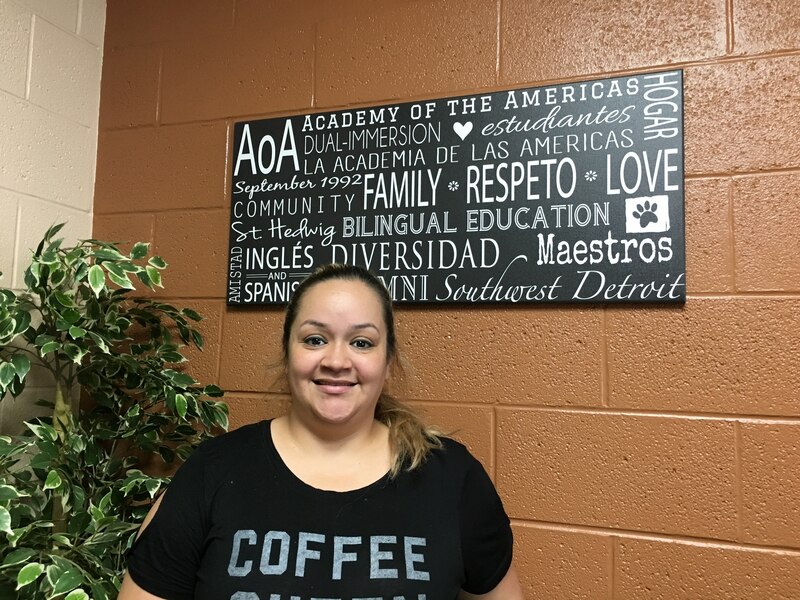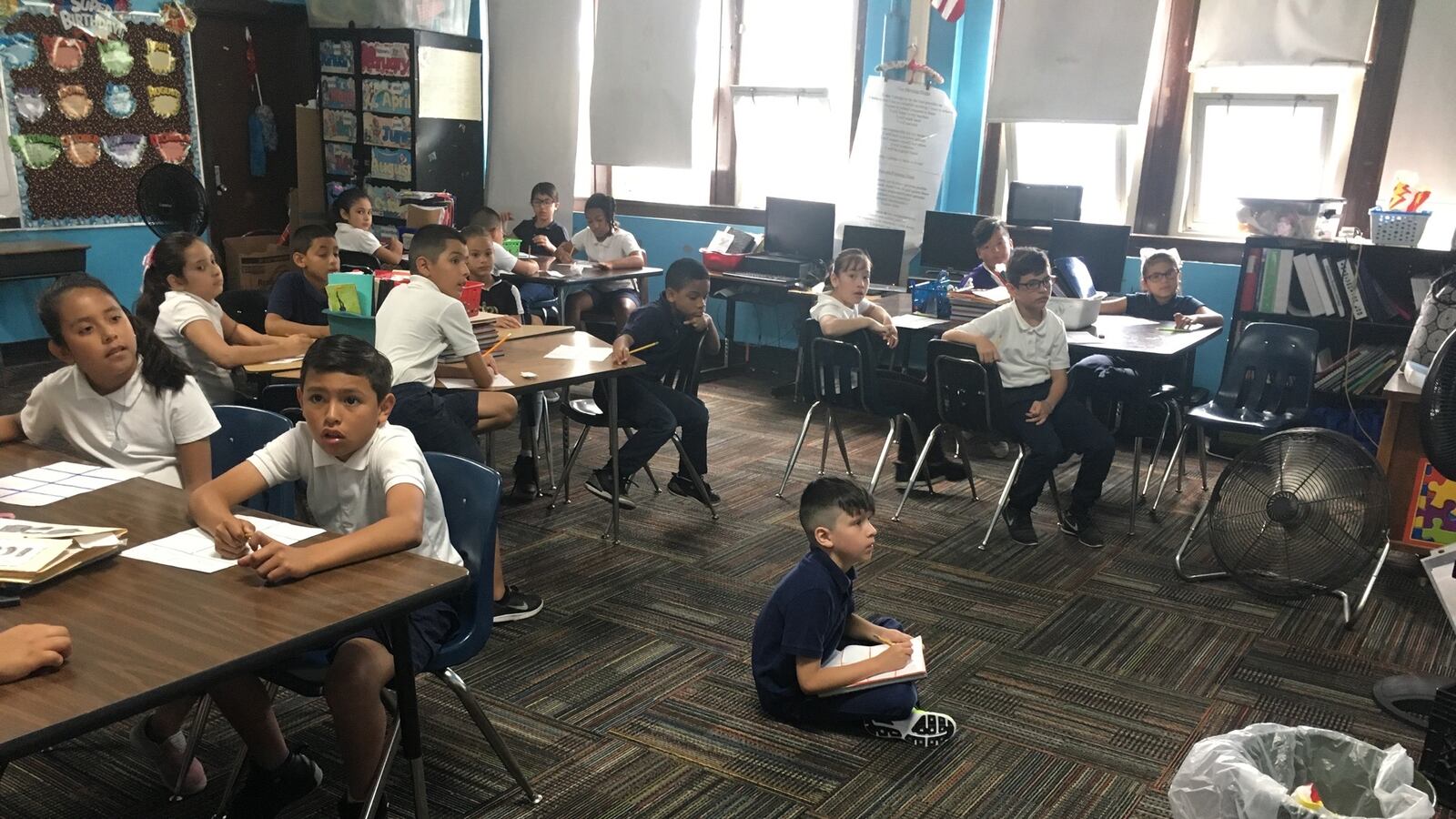The grocery store down the street from Academy of Americas blasts Mexican pop music over the radio. A few blocks away, a taco truck takes orders in English and Spanish. On the Academy’s playground, third-graders go about the business of play using whichever language happens to land on their tongues.
Back in the classroom, kindergartners learn to add, subtract, and find the United States on a map using Spanish. Third-graders sit through English class, then walk across the hall for science class with a teacher who addresses them only in Spanish. The school, like the Southwest Detroit neighborhood that surrounds it, is truly bilingual, and it has the support of parents and experts who argue that “language immersion” at an early age helps English- and Spanish-speakers effectively learn two languages for the price of one.
But dual-language immersion programs like this one are about to run smack into a controversial state law. Beginning in 2020, third-graders at Academy of the Americas won’t be able to move on to the fourth grade until they pass a state reading exam — in English.
Critics have raised a wide range of questions about the 2016 law, which would have caused nearly half of Michigan students to be held back a grade if the law took effect last year.
But perhaps most puzzling is that a law designed to improve literacy in Michigan could penalize the small handful of programs with a track record of teaching students — especially English learners — to read in not one, but two languages.
When 89 third-graders at the Academy took the test in 2016, only a single student met state standards. If the law had been in effect, almost every one would have repeated the third grade.
While the school is among the most highly sought programs in the district, the low reading scores were not terribly surprising. Kindergarten classes at the academy are conducted in Spanish for 90 percent of the school day. By the third grade, students hear Spanish for 60 percent of the day. Experts in bilingual education say students in such programs typically fall behind their English-only peers in reading, then catch up around middle school.
But under state law, third-graders in Michigan’s roughly 10 bilingual programs could be held back anyway.
“I can’t wrap my head around it,” said Norma Hernandez, the district’s former director of the Office of Bilingual Education. “Our kids are going to be left behind.”
Academy of the Americas was founded by Hispanic parents determined to help their children hold on to their native language. Learning English, they knew, was both inevitable and necessary in the United States. But why couldn’t a school also help children master the language spoken at the family dinner table?
As it turns out, dual-immersion schools like the Academy are backed by solid research showing that students who learn more than one language from an early age tend to catch up to their monolingual peers in English reading. This holds true even for students who speak Spanish at home, and it also helps them maintain their native language. More than 1,000 similar programs are in place across the country.
“They’re learning to read and write in both languages,” said Cecilia Jungo, a parent at the school, speaking in Spanish. “They’re totally bilingual,” she added.
Earlier this month, folders were propped up on every desk in a third-grade social studies classroom at the Academy, forming a barrier in case students felt tempted to scan their neighbors’ tests. As some began to fidget, the teacher slipped in a vocabulary lesson.
“If you are already finished with the test,” she said, speaking in Spanish, “just put your head on the — what?”
“The table!” the students shouted — also in Spanish.
In the hallway outside, Principal Nicholas Brown said that this minilesson will eventually improve the students’ performance on language tests, in English as well as Spanish.
“We’re teaching kids to read and write,” he said. “When they learn to read in Spanish, they are able to transfer those skills to English, so that when English is introduced they’re able to attack it.”
He admits that this approach won’t pay dividends on English reading tests right away, but says they will catch up by middle school.
But this model of reading is “not the same theory that the lawmakers were adhering to when they developed the law,” said Paula Winke, a professor at Michigan State who studies bilingual education. Legislators pointed to a different body of research — studies showing that students who don’t learn to read English well by the third grade are less likely to graduate high school.
Both models may hold some truth, Winke said, but the law only makes room for one. The learning patterns of bilingual students, well-established by researchers, were apparently “not considered,” she added.
Researchers at Michigan State are studying how the law will affect all students in immersion programs, including native English speakers. But they have already concluded that third-graders who speak English as a second language could be held back at disproportionate rates. According to Winke’s analysis of previous years’ test data, some 70 percent could be flunked.
Those projections are forcing dual-language programs to make tough decisions, especially when most of their students arrive in kindergarten speaking a language other than English.
Escuela Avancemos!, a charter school that stands only a few blocks from the Academy, offers some of its students a similar dual-language program. Kindergartners – most of whom speak Spanish at home — hear and speak Spanish for 90 percent of the school day. The proportion of English rises in each subsequent year.
But thanks to the reading law, that could change. “We’ve had to play around with those percentages,” Principal Sean Townsin told Chalkbeat during a school visit last month. “We’ve had to tweak it a little bit, especially in anticipation of the third-grade reading law.”
Townsin acknowledges that an extra hour or two of English instruction per day might not be enough to save his students from repeating the third grade. Last year, 39 of the 47 students tested in reading would have flunked. He also plans to assemble samples of students’ work, taking advantage of a section of the law that allows students to prove their reading ability to the state by submitting a portfolio instead of taking a test.
Brown, principal at the Academy, also plans to send portfolios to the state, but he won’t reduce the amount of Spanish students hear in class. He thinks the bilingual program is largely responsible for the school’s enrollment growth of 50 percent in the last two decades, no small accomplishment in a city where schools compete fiercely for students.
What’s more, he says parents would revolt if he watered down the immersion program.
“At the end of the day, our parents are very clear” in their support for the program,” he explained. “The school was created as a direct response to a community need.”
The Academy was founded in 1992 by a group of Hispanic parents who wanted a school that wouldn’t alienate the children of Southwest Detroit from the language of their grandparents. They believed that hearing teachers and classmates speak Spanish would help students stay connected to their culture and make them more employable.
Brown, the son of a Venezuelan and a Louisianan, knew first-hand that in traditional schools, English can replace a student’s native language rather than complement it. He says he rejected Spanish as a teenager and refused to speak it for seven years, relenting only after a visit to Venezuela made clear that the language was a link to his family.
These days, when students say “hello” in the halls, he responds in Spanish.
But he knows that these students could soon pay a price for their bilingualism. Flunking a grade can have severe emotional consequences, and there is little evidence that repeating a grade is beneficial to a child’s learning in the long-run.
“If students are retained because they didn’t pass a reading test, that’s going to hinder their education,” said Diane Rodriguez, a professor at Fordham University who specializes in bilingual education. “If those legislators went to another country, and they were given three years to pass an exam in a second language, I’m wondering if they’d be able to pass it.”
Brown, for his part, is waiting for clarification about the law before it goes into effect in the 2019-2020 school year.
“I have more questions than answers,” he said, adding that he would like to see the law changed: “I hope the program will speak for itself.”
Barring a change in course from the Legislature, his hopes rest with parents and with Superintendent Nikolai Vitti. Under the law, parents can request an exemption if their child fails the third-grade reading test, but the request must be approved by the superintendent for the child to move on to the next grade.

Parents at the Academy, however, argue that the state shouldn’t use its resources to grade student portfolios and process exemptions to the law.
Deysi Martinez, PTA president, noted that some states, like California and Colorado, allow students in immersion programs to prove their reading skills by taking additional reading tests in Spanish.
“In third grade, they’re reading mostly in Spanish,” she said of students at the Academy. “It doesn’t make sense for the test to be in English.”

